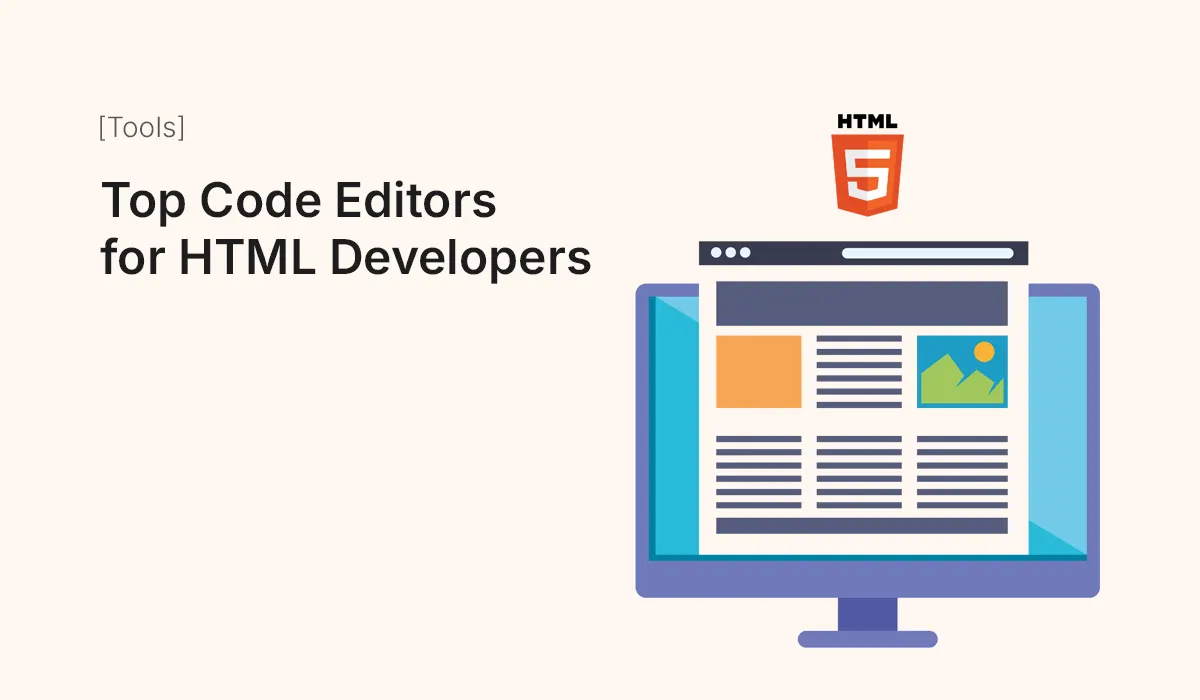Introduction
If you’re learning or working with HTML, choosing the right code editor can make a huge difference in your productivity. A good editor not only highlights syntax but also provides auto-completion, error detection, and integrations that make coding faster and more enjoyable.
Whether you’re a beginner or a professional web developer, this guide covers the top code editors for HTML developers, their features, and why you might choose one over another.
Why Use a Code Editor for HTML?
Technically, you can write HTML in any text editor (like Notepad), but modern code editors offer huge advantages:
- Syntax highlighting – Helps you read and debug code easily.
- Auto-completion – Saves time typing repetitive tags.
- Integrated tools – Git, terminal, extensions, and debuggers.
- Customization – Themes, plugins, and settings tailored to your workflow.
- Cross-platform support – Works on Windows, macOS, and Linux.
Top Code Editors for HTML Developers
Visual Studio Code (VS Code)
Why it’s great:
- Free and open-source
- Rich extension marketplace (HTML Snippets, Live Server, Prettier)
- Git integration
- IntelliSense (smart auto-completion)
- Cross-platform support
Best For: Beginners and professionals looking for a versatile editor.
Sublime Text
Key Features:
- Lightning-fast performance
- Multiple cursors for editing several lines at once
- “Goto Anything” for quick navigation
- Plugin support with Package Control
Best For: Developers who want a lightweight, distraction-free editor.
Atom (Discontinued but still used)
Highlights:
- Hackable editor built by GitHub
- User-friendly interface
- Community-driven plugins and themes
- Integrated GitHub features
Note: Atom was discontinued in 2022, but many developers still use it. Most users are migrating to VS Code.
Best For: Developers who like customization and open-source tools.
Brackets
Features:
- Specifically built for web development
- Live Preview with real-time browser updates
- Preprocessor support for LESS and SCSS
- Clean, lightweight UI
Best For: Front-end developers who want a simple, HTML/CSS/JS-focused editor.
Notepad++
Advantages:
- Free and very lightweight
- Syntax highlighting for HTML, CSS, JS, and more
- Plugin support for customization
- Portable version available
Best For: Beginners and quick code editing tasks.
WebStorm (Paid)
Features:
- Developed by JetBrains
- Advanced HTML, CSS, and JavaScript support
- Debugging and testing tools built-in
- Great for full-stack development
Best For: Professional developers and teams working on larger projects.
Vim
Key Points:
- Keyboard-based editor (steep learning curve)
- Extremely fast and customizable
- Runs in terminal environments
- Plugins available for HTML development
Best For: Experienced developers who love speed and efficiency.
Emacs
Why developers love it:
- Highly customizable and extensible
- Large collection of plugins
- Strong community support
- Great for coding and other productivity tasks
Best For: Power users who want total control of their workflow.
Factors to Consider When Choosing a Code Editor
- Ease of Use – Beginners should start with VS Code or Notepad++.
- Performance – Lightweight editors (Sublime, Notepad++) run faster on older machines.
- Customization – Editors like VS Code, Vim, and Emacs offer deep customization.
- Budget – Free editors (VS Code, Sublime, Notepad++) vs. Paid (WebStorm).
- Project Size – Small projects may not need advanced IDE features, but large applications benefit from them.
Best Code Editor for Beginners
If you’re just starting with HTML, the best options are:
- Visual Studio Code – Beginner-friendly, widely supported.
- Brackets – Simple and web-focused.
- Notepad++ – Lightweight, good for quick edits.
Best Code Editor for Professionals
For advanced developers:
- WebStorm – Powerful, enterprise-level features.
- VS Code – Flexible and full-featured.
- Vim/Emacs – High efficiency for experienced coders.
Common Mistakes When Choosing an Editor
- Overcomplicating – Beginners sometimes start with advanced editors and feel overwhelmed.
- Ignoring Performance – Heavy IDEs may slow down older systems.
- Not Exploring Plugins – Extensions can drastically improve your editor.
- Sticking to Defaults – Customizing themes and shortcuts boosts productivity.
Conclusion
The best code editor for HTML developers depends on your experience, project type, and personal preference. Beginners should start with something simple like VS Code, Brackets, or Notepad++, while professionals may prefer WebStorm, Vim, or Emacs for advanced workflows.
Whatever you choose, the key is to learn the features, customize your setup, and use your editor as a tool to enhance your coding journey.
Ready to boost your productivity? Download one of these top code editors for HTML developers today and start coding smarter, not harder!






